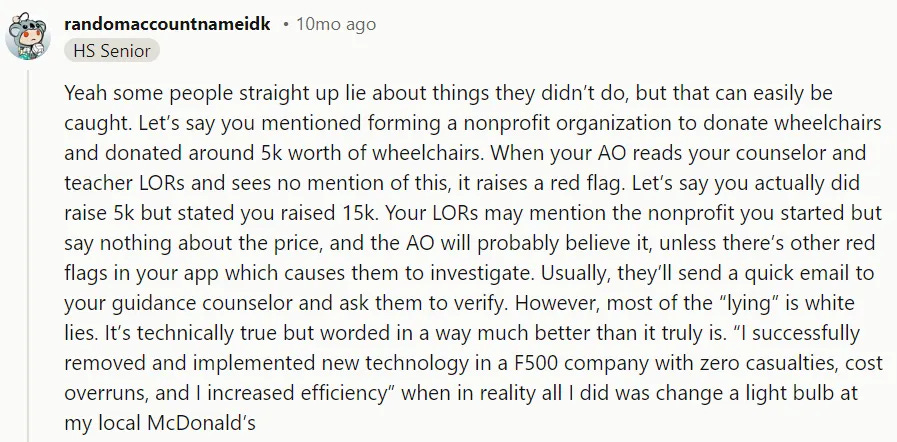Google Employee Fired for Exposing Internship Program Scandal
Unethical Practices in Gaining College Admissions Unveiled Again
Recently, a Chinese employee who had worked at Google for 13 years reported the Chinese management team within the company.
Whistleblowing in the workplace is not uncommon, but what sets this case apart is that the employee's report was not solely due to workplace disputes. Instead, it involved senior executives allegedly abusing their power to secure educational opportunities for their children.
Indeed, the lengths to which parents will go to ensure their children's education knows no bounds, transcending borders. While parents paving the way for their children's admission to prestigious schools is not new, the methods they employ continue to evolve in surprising ways.
01.Senior Executives' Children from Elite High Schools Participate in Programs Meant for Underprivileged Students?
Former Senior Manager at Google Files Lawsuit Against Company Executives, Alleging Discrimination and Abuse of Power.
Leilei Shan, a former Senior Manager of Corporate Engineering at Google, has recently filed a lawsuit in the California Superior Court. The suit accuses two high-ranking Chinese executives at Google of discrimination, unlawful retaliation, wrongful termination, and abuse of power. The defendants are identified as Director of Financial Engineering, Jannie Affeld, and Engineering Manager, Ying Liu.
Shan's accusations focus on two main points:
First, against Jannie Affeld:
Google has an "Apprenticeship Program" aimed at high school students, ostensibly promoting the company's diversity and inclusion efforts. However, Shan alleges that the program has been used to benefit the children of certain executives. Jannie Affeld, through her nonprofit organization InnoVantre, collaborates with the Apprenticeship Program, soliciting donations from the public and Google employees. While the organization claims to support underprivileged students, many participants in the program are actually the children of Google executives, attending elite private schools. This includes multiple children of both Jannie Affeld and Ying Liu. Shan accuses Jannie Affeld of raising funds under false pretenses, constituting fraud.
Second, against Ying Liu:
Shan claims that Liu hired a vendor closely associated with Jannie Affeld and, upon the contract's expiration, pressured Shan to retain this vendor under "false business reasons." Liu frequently emphasized that her success at Google was due to her loyalty to Jannie Affeld.
Additionally, Shan alleges that Liu imposed unreasonable "loyalty" demands on Chinese employees and made age-discriminatory remarks, stating that "younger employees are more passionate."
Court Documents Reveal Details of Shan's Complaint Against Google Executives
According to court documents, Leilei Shan filed a complaint with Google's Human Resources department last August, accusing Jannie Affeld and Ying Liu of misconduct. The company's investigation concluded that Affeld had failed to disclose her connection with InnoVantre, violating conflict of interest policies. Her penalty was a lower performance evaluation score. Liu, on the other hand, was reprimanded for fostering a culture of intimidation within her team.
However, just two days after lodging the complaint, Shan received his first negative performance review in his 13-year tenure at Google. By January, he was included in a layoff list, losing his job that paid an annual salary of $660,000.
02.Parents Skirt the Line Between Legal and Illegal to Secure Spots in Prestigious Universities for Their Children.
Scandals Involving Parents Securing Spots for Their Children in Prestigious Universities Are Not Isolated Incidents.
One of the most notorious cases we are familiar with is the largest college admissions scandal in U.S. history, exposed in 2019. The mastermind, William Singer, used fraudulent methods to help 57 children of wealthy families gain admission to top-tier universities, including Harvard, Stanford, and Yale. The total amount involved in the scandal reached $25 million.
If spending vast sums to fabricate identities for their children, bribing key decision-makers in the admissions process, or enlisting celebrities and prominent figures to write recommendation letters are examples of parents' grand gestures, then hiring expensive consultants to exaggerate or fabricate experiences in college application essays is considered routine.
On Reddit, there is a thread dedicated to listing exaggerated and fabricated experiences seen in college application essays.
For instance, someone who worked at McDonald's and changed light bulbs might describe the experience as, "I successfully implemented new technology at a Fortune 500 company without any incidents or budget overruns, significantly improving efficiency."
Falsifying Grades, Fabricating Application Materials, Bribing Relevant Personnel, Leveraging Networks to Uncover Insider Information, and Exploiting Loopholes in Exams……
In the current climate of fierce competition for quality educational resources and prestigious university admissions, anxious parents are resorting to all possible means to secure better educational opportunities for their children. They oscillate between the gray areas and illegal pathways in their relentless pursuit of these goals.
03.The Delicate Dimensions of Connections
In academia and the workplace, interpersonal relationships often involve one party gaining guidance and opportunities through relationship-building. This type of relationship should be open and fair, with no conflicts of interest between the parties involved.
Nepotism, on the other hand, involves gaining unfair advantages through personal connections. These "unfair advantages" might come from acquaintances or decision-makers showing favoritism.
The United States is a country that values the "recommendation system" and places great importance on "interpersonal relationships." Applying to prestigious schools often requires recommendation letters from teachers, principals, or coaches. Pursuing advanced studies requires endorsements from former mentors, and job hunting frequently relies on recommendations from insiders. Significant life changes and progress often necessitate someone vouching for you.
Therefore, building one's interpersonal relationships is strongly encouraged, but engaging in nepotism can lead to serious legal consequences.
A high-quality recommendation letter ideally comes from a prominent recommender who has closely collaborated with the student in academic settings. However, the most crucial aspect is the recommender's comprehensive understanding and genuine evaluation of the student. A recommendation letter becomes more persuasive when the recommender can detail the student's performance, abilities, and potential in specific projects. This reflects the recommender's deep knowledge and trust in the student, providing the admissions committee with reliable information.
If the recommender is well-known but has a superficial relationship with the student, the recommendation letter might lack substantive content and end up being a collection of empty adjectives and superficial praise. Such a letter is unlikely to enhance the application.
Parents should be responsible for their children's education, but the extent and methods of this responsibility are subjects for discussion. If parents use their connections or unlawful means to get their child into a prestigious university, will the child truly appreciate their parents' efforts, recognize their own abilities, and face future challenges confidently? This is a question worth pondering.








